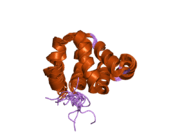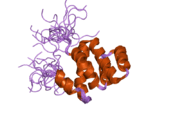NOD1
| View/Edit Human | View/Edit Mouse |
Nucleotide-binding oligomerization domain-containing protein 1 is a protein receptor that in humans is encoded by the NOD1 gene.[3][4] It recognizes bacterial molecules and stimulates an immune reaction.
NOD1 protein contains a caspase recruitment domain (CARD). NOD1 is a member of NOD-like receptor protein family and is a close relative of NOD2. NOD1 is an intracellular pattern recognition receptor, which is similar in structure to resistant proteins of plants, and mediates innate and acquired immunity by recognizing bacterial molecules containing D-glutamyl-meso-diaminopimelic acid (iE-DAP) moiety. Nod1 interacts with RIPK2 through the CARDs of both molecules (See the structure of the NOD1 CARD in the right panel). Stimulation of NOD1 by iE-DAP containing molecules results in activation of the transcription factor NF-κB.
Further reading
- Martinon F, Tschopp J (2006). "NLRs join TLRs as innate sensors of pathogens.". Trends Immunol. 26 (8): 447–54. doi:10.1016/j.it.2005.06.004. PMID 15967716.
- Strober W, Murray PJ, Kitani A, Watanabe T (2006). "Signalling pathways and molecular interactions of NOD1 and NOD2.". Nat. Rev. Immunol. 6 (1): 9–20. doi:10.1038/nri1747. PMID 16493424.
- Inohara N, Koseki T, Lin J, et al. (2000). "An induced proximity model for NF-kappa B activation in the Nod1/RICK and RIP signaling pathways.". J. Biol. Chem. 275 (36): 27823–31. doi:10.1074/jbc.M003415200. PMID 10880512.
- Inohara N, Ogura Y, Chen FF, et al. (2001). "Human Nod1 confers responsiveness to bacterial lipopolysaccharides.". J. Biol. Chem. 276 (4): 2551–4. doi:10.1074/jbc.M009728200. PMID 11058605.
- Chu ZL, Pio F, Xie Z, et al. (2001). "A novel enhancer of the Apaf1 apoptosome involved in cytochrome c-dependent caspase activation and apoptosis.". J. Biol. Chem. 276 (12): 9239–45. doi:10.1074/jbc.M006309200. PMID 11113115.
- Yoo NJ, Park WS, Kim SY, et al. (2003). "Nod1, a CARD protein, enhances pro-interleukin-1beta processing through the interaction with pro-caspase-1.". Biochem. Biophys. Res. Commun. 299 (4): 652–8. doi:10.1016/S0006-291X(02)02714-6. PMID 12459189.
- Strausberg RL, Feingold EA, Grouse LH, et al. (2003). "Generation and initial analysis of more than 15,000 full-length human and mouse cDNA sequences". Proc. Natl. Acad. Sci. U.S.A. 99 (26): 16899–903. doi:10.1073/pnas.242603899. PMC 139241
 . PMID 12477932.
. PMID 12477932. - Scherer SW, Cheung J, MacDonald JR, et al. (2003). "Human Chromosome 7: DNA Sequence and Biology". Science. 300 (5620): 767–72. doi:10.1126/science.1083423. PMC 2882961
 . PMID 12690205.
. PMID 12690205. - Matsuda A, Suzuki Y, Honda G, et al. (2003). "Large-scale identification and characterization of human genes that activate NF-kappaB and MAPK signaling pathways". Oncogene. 22 (21): 3307–18. doi:10.1038/sj.onc.1206406. PMID 12761501.
- Stehlik C, Hayashi H, Pio F, et al. (2003). "CARD6 is a modulator of NF-kappa B activation by Nod1- and Cardiak-mediated pathways". J. Biol. Chem. 278 (34): 31941–9. doi:10.1074/jbc.M300009200. PMID 12775719.
- Girardin SE, Boneca IG, Carneiro LA, et al. (2003). "Nod1 detects a unique muropeptide from gram-negative bacterial peptidoglycan". Science. 300 (5625): 1584–7. doi:10.1126/science.1084677. PMID 12791997.
- Hisamatsu T, Suzuki M, Podolsky DK (2003). "Interferon-gamma augments CARD4/NOD1 gene and protein expression through interferon regulatory factor-1 in intestinal epithelial cells". J. Biol. Chem. 278 (35): 32962–8. doi:10.1074/jbc.M304355200. PMID 12813035.
- Hillier LW, Fulton RS, Fulton LA, et al. (2003). "The DNA sequence of human chromosome 7". Nature. 424 (6945): 157–64. doi:10.1038/nature01782. PMID 12853948.
- Girardin SE, Travassos LH, Hervé M, et al. (2004). "Peptidoglycan molecular requirements allowing detection by Nod1 and Nod2". J. Biol. Chem. 278 (43): 41702–8. doi:10.1074/jbc.M307198200. PMID 12871942.
- Ota T, Suzuki Y, Nishikawa T, et al. (2004). "Complete sequencing and characterization of 21,243 full-length human cDNAs". Nat. Genet. 36 (1): 40–5. doi:10.1038/ng1285. PMID 14702039.
- Kim JG, Lee SJ, Kagnoff MF (2004). "Nod1 Is an Essential Signal Transducer in Intestinal Epithelial Cells Infected with Bacteria That Avoid Recognition by Toll-Like Receptors". Infect. Immun. 72 (3): 1487–95. doi:10.1128/IAI.72.3.1487-1495.2004. PMC 356064
 . PMID 14977954.
. PMID 14977954. - Damiano JS, Oliveira V, Welsh K, Reed JC (2004). "Heterotypic interactions among NACHT domains: implications for regulation of innate immune responses". Biochem. J. 381 (Pt 1): 213–9. doi:10.1042/BJ20031506. PMC 1133779
 . PMID 15107016.
. PMID 15107016. - Gerhard DS, Wagner L, Feingold EA, et al. (2004). "The Status, Quality, and Expansion of the NIH Full-Length cDNA Project: The Mammalian Gene Collection (MGC)". Genome Res. 14 (10B): 2121–7. doi:10.1101/gr.2596504. PMC 528928
 . PMID 15489334.
. PMID 15489334.
References
- ↑ "Human PubMed Reference:".
- ↑ "Mouse PubMed Reference:".
- ↑ Bertin J, Nir WJ, Fischer CM, Tayber OV, Errada PR, Grant JR, Keilty JJ, Gosselin ML, Robison KE, Wong GH, Glucksmann MA, DiStefano PS (Jun 1999). "Human CARD4 protein is a novel CED-4/Apaf-1 cell death family member that activates NF-kappaB". J Biol Chem. 274 (19): 12955–8. doi:10.1074/jbc.274.19.12955. PMID 10224040.
- ↑ Inohara N, Koseki T, del Peso L, Hu Y, Yee C, Chen S, Carrio R, Merino J, Liu D, Ni J, Nunez G (Jul 1999). "Nod1, an Apaf-1-like activator of caspase-9 and nuclear factor-kappaB". J Biol Chem. 274 (21): 14560–7. doi:10.1074/jbc.274.21.14560. PMID 10329646.
External links
- NOD1 human gene location in the UCSC Genome Browser.
- NOD1 human gene details in the UCSC Genome Browser.




